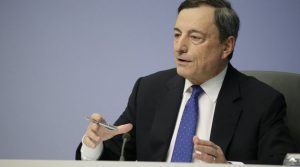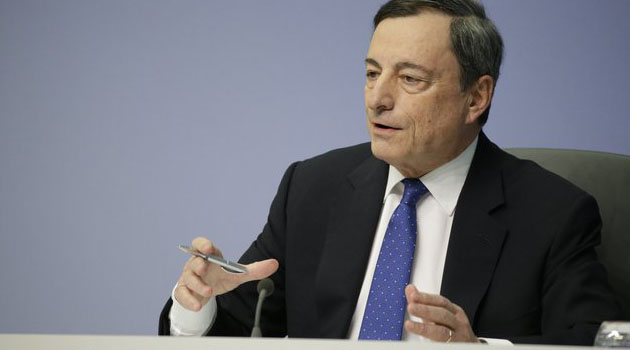Draghi Joined Macron in Telling Germany how Eurozone must be Reformed

Mario Draghi the President of ECB, speaking at the European University Institute inFlorence, on 11 May 2018, must have been under the influence of the idealistic aura of this Florentine learning institution. He went as far as proposing political policies, bravely overstepping his role as central banker of Eurozone. Draghi asked for an effective “European deposit insurance scheme”. He also proposed the creation of “an additional fiscal instrument to maintain convergence during large shocks” in Eurozone.
Those are two clearly set ideas. The first is about a credible and adequately financed common euro area bank deposit guarantee scheme. The second one is tantamount to a Financial Ministry and minister in Brussels, with a macro-economically important budget. Both proposals are identical to Emmanuel Macron’s ideas about how to reform and save the European Union. The French President reiterated and amplified his well known proposals on 10 May in Aix-la-Chapelle, while receiving the Charlemagne Prize in front of an audience comprising Angela Merkel and other top European leaders. This time, Macron didn’t chew his words and told the German Chancellor, who was sitting just a few meters from him, what her country must do. Let’s take one thing at a time.
The Italian banking crisis
Returning to Florence, we find Draghi asking for the creation of a true ‘Banking Union’ with a powerful Single Resolution Fund (to resolve failing banks), backed by the financial powers of all the sovereign governments of euro area, including the one based in…Berlin. Currently, this Fund is financed by small annual contributions paid by the lenders, being overtly incapable of confronting a real banking crisis, but this arrangement is totally inadequate and cannot save even the smallest bank. During the last three years, this was evident in the case of Italy.
During that period, Italy, despite been over-indebted, was forced to alone save a number of failing banks. In this way the Italian government dived deeper into debt and consequently was unable to adequately support economic growth. This had devastating effects on the country’s political developments. The result is an impossible government, being currently about to be formed by the ‘5 Star Movement’ party led by a comedian, plus the anti-European, extreme right populists of ‘Lega’. All of them promised greener grass, to win the 4 March elections.
They will end up blaming Europe for their treachery and the failure to honor promises. Politically then, it’s not an exaggeration to predict that Italy’s future in the euro area is at stake. Such a dreadful prospect may trigger the unravelling of the entire euro money block.
An effective backstop
Obviously, this is what Draghi wanted to avoid, when he said “What is still missing, however, is a backstop for the Single Resolution Fund. That is why in all the other large jurisdictions, such as the US, the UK and Japan, resolution funds are backstopped by the fiscal authority”. He expertly identified here a critical deficiency of Eurozone. Clearly, the euro area lacks a real banking union, with a dependable risk sharing mechanism, backed by all member states’ financial resources.
If such a mechanism existed, it would have reduced the country risk for all and every member state. In 2014, Germany blocked the enactment of such a powerful financial instrument, by compromising the Single Resolution Fund. As the Fund was finally shaped in June of that year, currently, it cannot handle in an orderly and low cost way the resolution of any bank.
What is missing?
Undeniably, if there was a common EU and strong fiscal authority and a euro area bank deposit guarantee system in Brussels, the Italian banking crisis would have cost much less. By the same token, it wouldn’t have produced today’s political stalemate, which may prove to be a bomb in the foundations of Eurozone and the EU.
Germany is the only economic power which blocked the creation of such a pan-European and effective Single Resolution Fund. In 2014, Berlin opposed the creation of such a Fund, fearing that it will be only Germany to pay for it. Now however, Macron says France is ready to undertake the proportionately right part of the financial burden to mend that, so Germany cannot go on stubbornly using this argument.
France can fund it
Last week in Aix-la-Chapelle, the French leader said it clearly, speaking after he received the prestigious Charlemagne Prize. He stated, “C’est pourquoi je crois dans un budget européen beaucoup plus ambitieux, dans lequel la France prendra sa part de contribution…défendre une convergence économique, fiscal… C’est pour cela que je crois à une zone euro plus forte, plus intégrée, avec un budget propre permettant les investissements et la convergence parce que c’est le seul moyen de permettre à tous les États qui souhaitent aller de l’avant, d’aller en cette direction”. (“That’s why I believe in a much more ambitious European budget, for which France is to undertake her contribution…to defend an economic, fiscal convergence…That’s why i believe in a much stronger euro area, more integrated, with its own budget which will support investments and convergence because this is the only means to open the way to all member states who wish go forwards, to go in this direction”).
He had more to say though. Macron also pointedly said that the German surpluses are the deficits of somebody else and this cannon go on: “en Allemagne, il ne peut pas y avoir un fétichisme perpétuel pour les excédents budgétaires et commerciaux parce qu’ils sont toujours faits aux dépens de certains autres”. (“In Germany, the ongoing fetishism for budget and trade surpluses cannot go on any more, because they are always accumulated on certain other people’s expenses”).
At the expenses of others
Every year, Germny turns out a trade surplus of some tens of euro billions with her EU partners. Unfortunately, she hoards those colossal funds and refuses to recycle them. Thus in the long run, this country inhibits the entire euro area’s economic system from functioning properly. Actually, Germany neutralizes the abilities of her trade partners to grow. The political side effects have been evident in the periphery of Eurozone. During the past few years one after the other Italy, Greece, Spain, Portugal and Ireland have been politically functioning on the brink of the abilities of their party systems.
As noted in the introduction, Draghi completed his vision for Europe, proposing also the creation of a common pan-European fiscal instrument, he said … “such an instrument (a Eurozone budget) could take: from the provision of supranational public goods – like security, defense or migration – to a fully-fledged fiscal capacity”. It may not be by chance that with a difference of a few hours -10 May for Macron, 11 May for Draghi – the two proposed detailed and identical reforms about how the Eurozone can avoid being wasted away in a few years. Each of them explained what is needed to be done, the way they knew best; Macron in political terms and Draghi with solid economic reasoning.
The question remains though, if they can force Germany to accept the reality that Eurozone cannot go on creating surpluses only for this country.
Courtesy : europeansting.com
Photo : vestifinance.ru
[social_warfare buttons=”Facebook,Pinterest,LinkedIn,Twitter,Total”]



